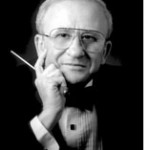By David Amos
 SAN DIEGO–Here is another chapter in which I share with you more of my favorite quotes from the world of music. Some are funny, some are serious; others run the gamut from outrageous and stupid to insightful and prophetic. All of them, though, give us a bit more of a perspective into the concept that even if we may be very knowledgeable in matters musical, “it ain’t necessarily so”. Enjoy.
SAN DIEGO–Here is another chapter in which I share with you more of my favorite quotes from the world of music. Some are funny, some are serious; others run the gamut from outrageous and stupid to insightful and prophetic. All of them, though, give us a bit more of a perspective into the concept that even if we may be very knowledgeable in matters musical, “it ain’t necessarily so”. Enjoy.
Following are two excerpted reviews of concerts of Beethoven’s music, from 1829 and 1845, as found in Nicolas Slonimsky’s Lexicon of Musical Invective: “ The Eroica Symphony contains much to admire, but it is difficult to keep up admiration of this kind during three long quarters of an hour. It is infinitely too lengthy…If this symphony is not by some means abridged, it will soon fall into disuse.” And, “The Missa Solemnis was generally regarded as an incomprehensible production, the depths of which (if they were really depths), it was impossible to fathom. This opinion, I confess, I adopted. After pouring for hours after the ponderous pages, the only result was an absolute bewilderment among its mazes.”
From The Book of Musical Anecdotes: An English singer named Gordon, once found fault in the way George Frederick Handel was accompanying him. High words ensued; and Gordon finished by saying that if Handel persisted in playing the keyboard in this manner, he would jump upon his harpsichord and smash it to pieces. “Oh”, replied Handel, “let me know when you will do that, and I will advertise it; for I am sure more people will come to see you jump than to hear you sing!’
And from Arnold Schoenberg’s diary of February 1912: “A publisher asked me about Mahler, and when I expressed enthusiasm, asked whether he should perhaps not have the plated of his Fifth Symphony melted down. I replied ‘For God’s sake, not that, of all things. Today’s young people worship Mahler like a God. His time will come in, at most, five or ten years.”
From Walter Slezak’s entertaining book What Time’s The Next Swan? : Singing teachers are a special breed of people. To become one, you only have to say, “I am a singing teacher!” That’s your diploma, these are your credentials. To supervise your four and five year olds playing with blocks in the kindergarten, to teach them the ABCs, to treat corns on your feet, to cut your hair, give you a massage –all require proof of training—and a license. But that rarest gift of God, that wonderful, intangible human voice? Anybody can fool around with it; every broken down, third rate singer, every unsuccessful piano teacher, every flunked out music student. All you need is a room with a piano, photos of a few well known singers on the wall (the implication being that they are “pupils”), and you are in business and automatically addressed as “Professor”.
( I have talked many times about the rampant charlatanism in the murky world of conducting).
From Schuyler Chapin’s book on Leonard Bernstein, which I recently reviewed: “Conducting French orchestras is always a tricky business. Players turn up for rehearsals, but often send substitutes for actual concerts. This has to do in part with the antiquated work rules and in part with French quirkiness about artistic independence. Lenny knew about these caprices from earlier engagements, and his contract stipulated that the players who rehearsed were to be the players who performed. As a consequence to this proviso, when he mounted the podium for his first rehearsal, he looked over a sullen group of musicians prepared to make his life unpleasant. I sat in the auditorium, waiting to pick up the pieces.”
( I have heard stories of certain American conductors who have recorded and done concerts with London orchestras, to specify in their contracts the musicians they expected to be at the sessions, by name. No substitutions, please.)
Hector Berlioz gave this toast in his book Evenings in the Orchestra: “To Music, gentlemen, its reign has come! It protects drama, it clothes comedy, it perfumes tragedy, it shelters painting, it impassions dancing, it bans that little vagabond, vaudeville, it shoots down those who oppose its progress, it throws the representatives of routine overboard, it is triumphant in France, Germany, England, Italy, Russia, and even in America”.
( I have also mentioned repeated times how European music critics, to this day, put down serious American music).
Composer Gian-Carlo Menotti: “ I believe that this mysterious entity called melody is a form of memory. Actually, when you discover a melody, you discover something that already exists. Melody is music that you suddenly recognize. It is inevitable. It’s already there. Something out of the collective unconscious, as Jung might say. The problem is how to find it, and once you find it, how to gather it without harming or soiling its purity.”
I had the privilege and pleasure to meet with, and work with Menotti on recordings of his music. Here are two other quotes of his which intrigued me: “My life is an open book; however, I don’t like to leave it around,” and, “The strength of a government is not measured by what it forbids, but the amount of freedom it can allow.”
This is a good quote to lead us to the upcoming festival of Hannukah, which celebrates freedom from oppression.
*
Amos is conductor of the Tifereth Israel Community Orchestra in San Diego and guest conductor of professional orchestras around the world.